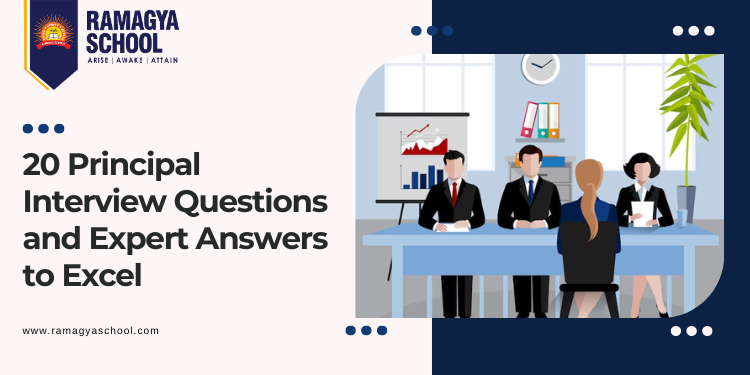The role of a school principal is pivotal in shaping the future of students and the overall educational environment. Principals not only oversee the daily operations but also set the tone for the school’s culture and vision. It’s no wonder that the interview process for selecting a principal is comprehensive and demanding. In this blog, we will delve into 20 principal interview questions and provide expert answers to help aspiring school leaders prepare for this critical step in their careers.
Top 20 Principal Interview Questions
- Can you describe your educational philosophy and how it aligns with our school’s mission and values?
Expert Answer: “I believe in fostering a learning environment that prioritizes both academic excellence and character development, which closely aligns with your school’s mission to provide holistic education.” - What strategies have you used to improve student achievement in your previous role as a school leader?
Expert Answer: “I’ve implemented data-driven instruction, regular teacher collaboration, and intervention programs to target student needs and drive improvement.” - How do you plan to involve parents and the community in the educational process?
Expert Answer: “I believe in open communication, regular meetings, and community events to create strong partnerships between the school, parents, and the community.” - What measures will you take to ensure the well-being of students and staff?
Expert Answer: “Safety protocols, emergency drills, and mental health support are top priorities. Collaboration with local law enforcement and professional development on safety matters will be crucial.” - How will you handle conflicts and disagreements among the staff or between staff and parents?
Expert Answer: “Open communication and a clear conflict resolution process are essential. My approach is to listen actively, mediate when necessary, and find common ground.” - Can you describe your experience in managing budgets and allocating resources effectively?
Expert Answer: “I have a strong track record of budget management, optimizing resource allocation to support educational priorities while maintaining fiscal responsibility.” - What steps will you take to stay updated on the modern educational trends and best practices?
Expert Answer: “Continuous professional development, attending conferences, and fostering a culture of innovation among staff are essential to stay current.” - How do you plan to promote diversity, equity, and inclusion in the school?
Expert Answer: “I’ll ensure diverse curricula, inclusive policies, and a welcoming environment for all students. Equity audits and cultural competency training for staff will be part of the strategy.” - Can you provide an example of a successful school improvement initiative you’ve led in your previous role?
Expert Answer: “I spearheaded a literacy program that boosted reading proficiency levels by 20% within a year through targeted interventions and a culture of reading.” - In the face of declining enrollment, how would you work to maintain the school’s reputation and financial stability?
Expert Answer: “I’ll conduct a comprehensive enrollment analysis, collaborate with the community for recruitment, and explore innovative programs to attract students. Financial prudence is key.” - What strategies do you have for motivating and supporting teachers to ensure they reach their full potential?
Expert Answer: “I believe in mentorship, professional development opportunities, and recognition programs to inspire and support educators in their growth.” - How will you handle sensitive situations involving student discipline and ensure fairness and consistency in disciplinary actions?
Expert Answer: “I’ll prioritize a fair and consistent disciplinary process, focusing on restorative practices to help students learn from their mistakes and grow.” - Can you share your vision for technology integration in the classroom and how it enhances the learning experience?
Expert Answer: “I envision a technology-rich environment that empowers students to become digital citizens. Blended learning, online resources, and teacher training[1] will be key components.” - What strategies will you employ to address the diverse needs of students, including those with special needs and English language learners?
Expert Answer: “I’ll ensure differentiated instruction, personalized learning plans, and professional development for teachers to meet the unique needs of every student.” - How do you plan to handle communication with parents and the broader community, especially in times of crisis or controversy?
Expert Answer: “Transparency, regular updates, and a crisis communication plan are crucial. I’ll work closely with the school board, staff, and community leaders to address concerns effectively.” - What is your approach to setting and achieving measurable goals for student achievement and school improvement?
Expert Answer: “I believe in data-informed decision-making. We’ll set SMART (Specific, Measurable, Achievable, Relevant, and Time-bound) goals, regularly assess progress, and adjust strategies as needed.” - Can you provide examples of successful strategies you’ve used to build a positive school culture?
Expert Answer: “I’ve initiated mentorship programs, character education initiatives, and recognition events to create a welcoming and positive school culture.” - In what ways will you involve students in the decision-making process and ensure that their voices are heard?
Expert Answer: “I’ll establish student councils, conduct surveys, and provide opportunities for students to participate in school governance, ensuring their perspectives are considered.” - How would you address the mental health and well-being of both students and staff, especially in challenging times?
Expert Answer: “Mental health support, counseling services, and staff wellness programs will be priorities. Creating a stigma-free environment and access to resources are crucial.” - Can you share your experience with crisis management and how you’d handle emergencies within the school community?
Expert Answer: “I’ve successfully managed various crises, including natural disasters and security threats, by ensuring clear protocols, regular drills, and open communication.”
The role of a school principal is multifaceted, requiring strong leadership, vision, and a deep commitment to the betterment of students’ lives. The above 20 principal interview questions and expert answers provide valuable insights for aspiring principals as they prepare to take on this critical responsibility.
Remember, each interview is an opportunity not only to showcase your qualifications but also to demonstrate your passion for education and your dedication to shaping a brighter future for the next generation.
Read our Article: Top Principal Interview Questions and How to Answer Them





